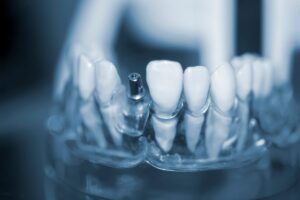Many people ask “can anyone have dental implants,” and the short answer is: not everyone immediately, but most people can become candidates after an exam or simple preparatory treatment. Candidacy depends on oral health, jawbone, and medical habits; with the right evaluation and care, many patients can get implants.
What Are Dental Implants?
Dental implants are small titanium posts placed into the jawbone to act like tooth roots. A crown, bridge, or overdenture attaches to the post to replace missing teeth. Implants are a long-term tooth-replacement option because they fuse with bone and feel and function like natural teeth.
Why People Choose Implants
– Stability: implants don’t slip like removable dentures. – Chewing: they restore strong biting force. – Bone preservation: implants help stop bone loss where teeth are missing. – Appearance and speech: they look and sound natural. Unlike traditional dentures or fixed bridges, implants replace the root as well as the tooth, which keeps the jaw healthier over time.
Key Medical Factors That Determine Candidacy
Bone quantity and quality
Enough jawbone is needed to hold the implant. When a tooth is missing for a long time, the bone can shrink. Bone grafts or sinus lifts can rebuild the area so an implant can be placed.
Gum and periodontal health
Active gum disease must be treated before implants. Dentists use digital periodontal assessment tools to measure pocket depth, bleeding, and gum attachment to plan safe implant care.
Overall health and medications
Conditions that affect healing—like uncontrolled diabetes, smoking, recent cancer radiation, or certain bone drugs (bisphosphonates)—can change implant success. Your dentist will review medications and may require medical clearance.
Age and growth considerations
Implants are rarely placed while jaws are still growing, so they’re usually avoided in young teens. Older age alone is not a barrier if overall health is stable.
How Dentists Evaluate Whether You Can Get Implants
A typical evaluation includes a full medical history, digital X-rays or 3D imaging to view bone and roots, a bite and gum exam, and screening for sleep apnea if relevant. Modern offices offer sedation options for anxious patients and use minimally invasive techniques to reduce cutting and recovery time.
When Implants Might Not Be the Best Option
If medical risk is high or a patient cannot undergo minor surgery, fixed bridges, removable dentures, or mini-implants may be safer. Severe bone loss or uncontrolled gum disease can also make alternatives more appropriate until the mouth is healthy.
How to Improve Your Chances of Becoming a Candidate
Take practical steps: stop smoking, control chronic conditions like diabetes, treat gum disease, and discuss bone grafting if needed. Follow your dentist’s medical clearance process and maintain good oral hygiene to increase success.
FAQ — “Can anyone have dental implants Rockville, MD?”
Short answer: Not everyone right away, but many people can after treatment or medical optimization. – Timeline: evaluation to final crown often takes a few months, longer if grafts are needed. – Common hurdles: low bone, active gum disease, smoking, and certain medications. – Typical next steps: schedule an exam, get digital imaging, and follow a personalized plan your dentist recommends.
About Your Care Team
Dr. Kavish Gurjar trained at NYU College of Dentistry (periodontal honors) and pursued advanced implant training and fellowships. He has restored hundreds of smiles and helps anxious patients with sedation options. The practice uses digital X-rays, minimally invasive tools, sedation dentistry, sleep apnea screening, and digital periodontal assessments to evaluate and treat implant candidates safely.
Next Steps / Call to Action
To find out if you can have dental implants Rockville, MD, schedule a consultation and bring a list of medications and any dental records. The clinic provides personalized plans, sedation options for nervous patients, and clear steps to get you ready for implants. Contact the office to book your exam.




